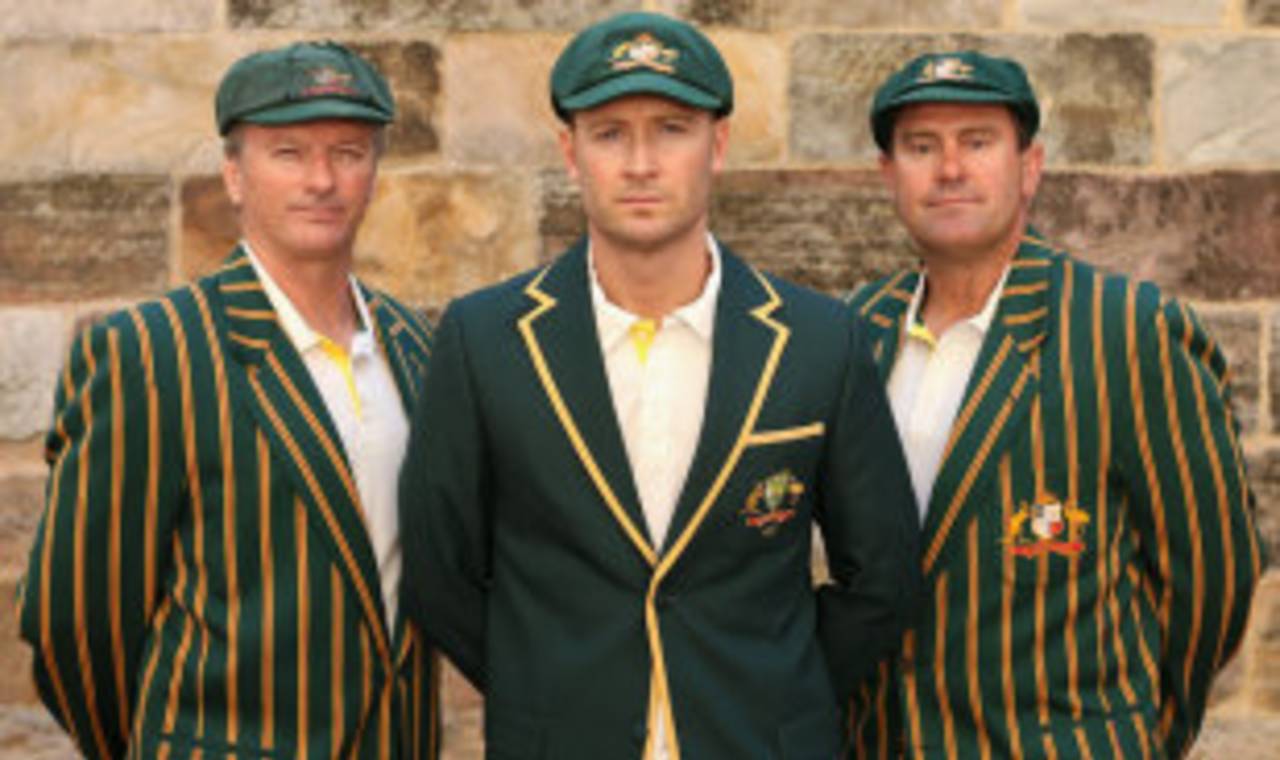The greatest rivalries are only partly about sport. They are really about collective identity, groups defining themselves in opposition to each other. After all, before any of us knows who we are, perhaps we need to know who we aren't.
That is certainly the case with the most historic of all cricketing rivalries: England v Australia. The stereotypes have hardened into mythology. As Simon Hughes points out in his entertaining new book, Cricket's Greatest Rivalry: "The wonderful thing about England v Australia is that we are mainly from the same stock. But the players on either side are so different."
In green and gold: the doughty Aussie battler, the plucky iconoclast, the band of brothers defying the odds. In regal navy blue: the slightly superior Englishman, aloof, haughty, half-amused at his upstart enemy. "The Australians are an uneducated and unruly mob," sneered Douglas Jardine, the most controversial of all England captains.
Where Jardine looked down his angular nose at the convict colony, his perfect counterpoint, Jeff Thomson, longed to land a blow on the imperial chin. "I couldn't wait to have a crack at 'em," Thomson said between thunderbolts in 1974. "I thought, 'Stuff that stiff upper-lip-crap. Let's see how stiff it is when it's split.'"
No matter that the vast majority of both Australian and English cricketers do not fit either mould. Let's be honest. Damien Martyn stroked cover drives with the same princely understatement as Colin Cowdrey did. And put Graham Thorpe in an Australian jumper and his rear-guard resilience would inspire knee-jerk punditry about the quintessential never-say-die Aussie battler. The stereotypes of the Ashes have always relied on a powerful mixture of reality and myth. And, of course, if you repeat something often enough, myth takes on an air of truthfulness.
The infamous Bodyline series, almost cricket's original sin, gave the rivalry a personal edge. For the individuals involved, Bodyline bruised everyone it touched. It tormented Bradman, outraged the Australian public, and threatened British-Australian diplomatic relations. But the welts and bruises inflicted on Australian bodies disappeared more quickly than the shadows on English reputations. The captain, Jardine, would be forever defined by the controversy. And Harold Larwood never played for England again, lost his appetite for the game, and eventually emigrated - to Australia, of all places.
And yet from a historical perspective Bodyline deepened and enriched the Ashes. Ever since, hints of righteousness and guilt have coursed through the rivalry. Each side jostles for the moral high ground. They sledge, we banter; they stand, we walk; they scoop up catches, we trust the fielder; you started it, we just held our ground.
That is one reason why the first match of an Ashes summer carries a special tension. England will play Australia 25 times between now and next February. Round one, at
Edgbaston last Saturday, provided hints about how the two boxers will approach the slugfest ahead. If you believe in augurs, Mitchell Starc's first ball bodes ill for Australia: a leg-stump gift, clipped for four by Alastair Cook. The rest of the contest was strangely bloodless. England so successfully bottled up Australia that the contest ended with a heavy points victory rather than a single knockout punch.
With India and Pakistan, the world looks to sport to deflate underlying tensions rather than inflame them. With England and Australia, we pretend there is underlying viciousness to what is really a settled diplomatic friendship
The smart money is on England, more so every day. But a part of me, conditioned by decades of Ashes suffering, refuses to believe that Australia will not rally. But perhaps I am too influenced by the weight of history to judge any Australian side with clear-eyed objectivity.
Another epic rivalry starts again this week when India play Pakistan in the Champions Trophy. It is rivalry from a very different tradition. The Ashes is as safe and harmless as a sporting rivalry could be. Even at its most ill-tempered, Australian-English relations descended only so far as a few angry diplomatic cables in 1932-33. The Ashes, a sporting conflict between two political allies, can afford to exacerbate the moments of needle and bitterness. After all, the Ashes has only been suspended by World Wars so that the two nations could fight side by side.
In contrast, India and Pakistan suspended cricketing relations between 1962 and 1977. Given the shadow of the India-Pakistan wars of 1965 and 1971, real military conflict was too immediate to permit the abstraction of a sporting contest.
When the cricket resumed, players were placed in a deeply uncomfortable position. This week I've been sharing a commentary box with Aakash Chopra, the former India batsman. He told me about the pressures that faced the preceding generation of Indian players when they competed with Pakistan.
"You could do anything in the world but you couldn't lose against Pakistan. Losing to Pakistan was sinful, it just wasn't allowed. It's silly, but it was considered a betrayal of your country. If they lost, effigies of players were burnt, their houses were vandalised."
Some things have certainly changed. Chopra recalls the 2003-04 tour, when India visited Pakistan for the first time in 15 years. "We were made to feel so at home. When we went shopping, people refused to take any money. The Pakistan people were such generous hosts. And it was massive news. Cricket led the news every day."
The hopeful thought arises: can sport lead politics? Chopra doubts it can. "We are still just playing a game. Politicians have tended to use sport to suit their own ends. Sportsmen have merely been pawns."
With India and Pakistan, the world looks to sport to deflate underlying tensions rather than inflame them. With England and Australia, we pretend there is underlying viciousness to what is really a settled diplomatic friendship.
Playing up to a rivalry is a lot easier - and safer - than playing it down.
Ed Smith's latest book is Luck - A Fresh Look at Fortune. He tweets here
